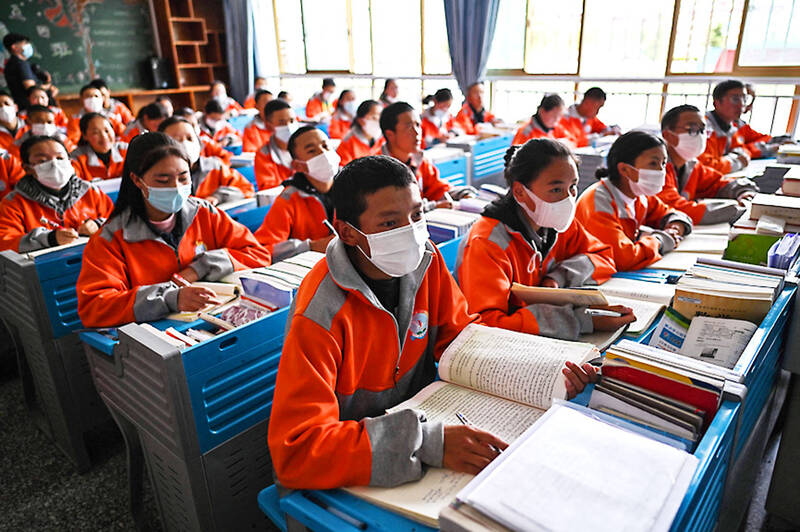The US on Tuesday said that it was imposing visa sanctions on Chinese officials pursuing “forced assimilation” of children in Tibet, where UN experts say 1 million children have been separated from their families.
In the latest of a series of US moves on Beijing despite a resumption of high-level dialogue, US Secretary of State Antony Blinken said the country would restrict visas to Chinese officials behind the policy of state boarding schools.
“These coercive policies seek to eliminate Tibet’s distinct linguistic, cultural and religious traditions among younger generations of Tibetans,” Blinken said in a statement.

Photo: AFP
“We urge PRC authorities to end the coercion of Tibetan children into government-run boarding schools and to cease repressive assimilation policies, both in Tibet and throughout other parts of the PRC,” he said, referring to the People’s Republic of China.
The US has since 2021 accused China of waging genocide in another region, Xinjiang, through what US officials, rights groups and witnesses say is a vast network of forced labor camps. China denies the charge.
A US State Department spokesperson said the new restrictions would apply to current and former officials involved in education policy in Tibet, but did not give further details, citing US confidentiality laws on visa records.
The US separately imposed sanctions in December last year on two top-ranking Chinese officials, Wu Yingjie (吳英杰) and Zhang Hongbo (張洪波), over what Washington said were widespread human rights violations in Tibet.
China called the US-backed allegations “smears” that “seriously undermine China-US relations.”
“As a common international practice, boarding schools in China are set up according to the needs of local students,” said Liu Pengyu (劉鵬宇), spokesman for the Chinese embassy in Washington.
“Boarding schools have gradually developed into one of the important modes of running schools in China’s ethnic minority areas, and the centralized way of running schools effectively solves the problem of ethnic minority students’ difficulty in attending school at a distance where the local people live scattered,” he said.
However, Blinken in his statement cited a finding given in February by three UN experts who said that about 1 million Tibetan children have been sent into boarding schools, often by force.
The program appears aimed at unwillingly integrating Tibetans into China’s majority Han culture, with compulsory education in Mandarin and no instruction culturally relevant to the Buddhist-majority Himalayan region, the special rapporteurs said.
A separate report this year from UN experts said that hundreds of thousands of Tibetans have also been forced out of traditional rural life into low-skill “vocational training” as a pretext to undermine their identity.
Tibet has alternated over the centuries between independence and control by China, which says it “peacefully liberated” the rugged plateau in 1951 and brought infrastructure and education to the previously underdeveloped region.
The Dalai Lama, who fled into exile in India in 1959, has won a global following through his spiritual teachings, raising awareness on Tibet.

PRECARIOUS RELATIONS: Commentators in Saudi Arabia accuse the UAE of growing too bold, backing forces at odds with Saudi interests in various conflicts A Saudi Arabian media campaign targeting the United Arab Emirates (UAE) has deepened the Gulf’s worst row in years, stoking fears of a damaging fall-out in the financial heart of the Middle East. Fiery accusations of rights abuses and betrayal have circulated for weeks in state-run and social media after a brief conflict in Yemen, where Saudi airstrikes quelled an offensive by UAE-backed separatists. The United Arab Emirates is “investing in chaos and supporting secessionists” from Libya to Yemen and the Horn of Africa, Saudi Arabia’s al-Ekhbariya TV charged in a report this week. Such invective has been unheard of

US President Donald Trump on Saturday warned Canada that if it concludes a trade deal with China, he would impose a 100 percent tariff on all goods coming over the border. Relations between the US and its northern neighbor have been rocky since Trump returned to the White House a year ago, with spats over trade and Canadian Prime Minister Mark Carney decrying a “rupture” in the US-led global order. During a visit to Beijing earlier this month, Carney hailed a “new strategic partnership” with China that resulted in a “preliminary, but landmark trade agreement” to reduce tariffs — but

Chinese President Xi Jinping’s (習近平) purge of his most senior general is driven by his effort to both secure “total control” of his military and root out corruption, US Ambassador to China David Perdue said told Bloomberg Television yesterday. The probe into Zhang Youxia (張又俠), Xi’s second-in-command, announced over the weekend, is a “major development,” Perdue said, citing the family connections the vice chair of China’s apex military commission has with Xi. Chinese authorities said Zhang was being investigated for suspected serious discipline and law violations, without disclosing further details. “I take him at his word that there’s a corruption effort under

China executed 11 people linked to Myanmar criminal gangs, including “key members” of telecom scam operations, state media reported yesterday, as Beijing toughens its response to the sprawling, transnational industry. Fraud compounds where scammers lure Internet users into fake romantic relationships and cryptocurrency investments have flourished across Southeast Asia, including in Myanmar. Initially largely targeting Chinese speakers, the criminal groups behind the compounds have expanded operations into multiple languages to steal from victims around the world. Those conducting the scams are sometimes willing con artists, and other times trafficked foreign nationals forced to work. In the past few years, Beijing has stepped up cooperation